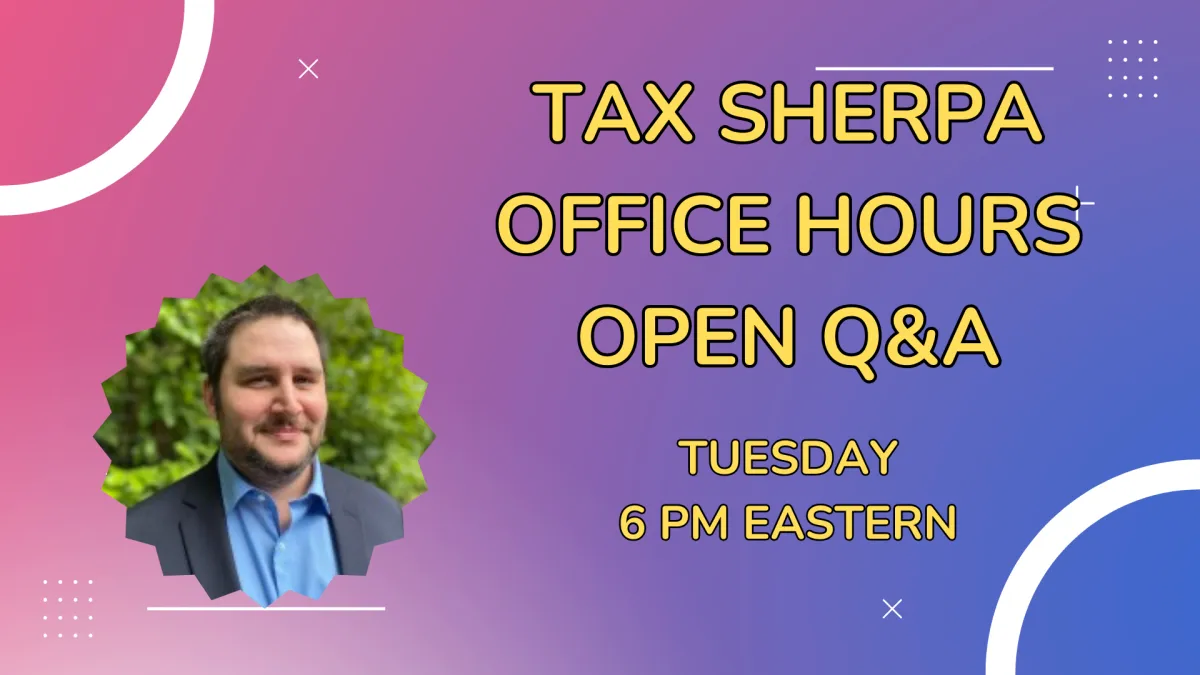Contact Us
office@taxsherpa.com
(678) 944-8367
Follow Us:
Our Blogs
On our blogs you will find our Tax Sherpa Stories series as well as additional posts covering all manner of tax topics. Some items are timely as there are multiple tax filing dates throughout the year and some items are important larger concepts.

Mastering Tax Complexities: Key Insights from Our Expert Webinar
Journey to Tax Advisory
Neal's path to becoming a tax advisory expert is as unique as it is inspiring. Trained as an electrical engineer at Georgia Tech, his transition from engineering to tax advisory wasn't a straightforward leap, but a response to a personal realization and a series of life experiences.
Engineering Roots and a Turning Point:
Neal's academic background in engineering wasn't the traditional precursor to a career in tax. His time at Georgia Tech and subsequent internship at AMD, a major player in the computer chip industry, were shaping up to be the start of a promising engineering career. However, a pivotal moment came during an awards ceremony at AMD. Witnessing a colleague being applauded for sacrificing personal time for corporate demands, Neal realized that the corporate path, with its potential sacrifices of personal values and family time, was not for him. This moment was the catalyst for Neal's entrepreneurial journey, marking the beginning of his shift towards tax advisory.
Facing Personal Tax Challenges:
Neal's transition wasn't smooth sailing. He faced significant personal tax challenges, including receiving IRS letters claiming he owed substantial sums. These experiences brought him face-to-face with the complexities and stress of tax management, particularly for individuals trying to navigate these waters alone. This period of difficulty was not only a learning curve but also a source of empathy towards others facing similar tax issues.
Engineering Approach to Tax Planning:
Neal's engineering background has profoundly influenced his approach to tax advisory. He applies an engineering mindset to tax planning - systematic, analytical, and solution-oriented. This methodology is especially effective in developing strategies that are not just about compliance, but about optimizing outcomes. His approach resonates with small business owners and solopreneurs, as it aligns with the systematic way they operate their businesses.
Resonating with Small Business Owners and Solopreneurs:
Neal's journey, marked by self-discovery, personal tax battles, and a pivot to entrepreneurship, mirrors the experiences of many small business owners and solopreneurs. His ability to relate to the challenges they face, combined with his unique problem-solving approach, positions him as not just an advisor but a peer who has walked a similar path. This connection makes Neal's advice and strategies all the more relevant and impactful for Tax Sherpa's clientele.
Understanding the Complexities of Tax Management
In this webinar, Neal McSpadden, with his extensive experience and unique perspective, delves into the intricacies of tax planning, providing valuable insights for small business owners and solopreneurs.
1. The Art and Science of Tax Planning:
Neal's approach to tax planning goes beyond mere calculation. He emphasizes the importance of understanding each business's unique situation, illustrating the necessity of a tailored approach rather than a one-size-fits-all solution. For Neal, tax planning is not just about looking at past data; it's about proactively strategizing for future financial health. He advocates for a dynamic approach, considering both current tax laws and potential future changes.
2. Cost Segregation: A Game-Changer for Property Owners:
Neal sheds light on the benefits of cost segregation, a critical yet often overlooked strategy for property owners. By breaking down a property's components into different categories with varying depreciation timelines, cost segregation allows for accelerated depreciation, leading to significant tax savings. Neal's explanation makes this complex strategy more accessible, particularly highlighting its benefits for those in real estate investments.
3. Navigating Foreign Income Taxation:
Neal's discussion on managing foreign income was particularly insightful for those with international dealings. He addressed the nuances of foreign income, from reporting requirements to understanding how it integrates with U.S. tax obligations. Neal stressed the importance of being aware of the global tax landscape, noting that different rules apply depending on whether the income is considered passive or active, and the implications of various tax treaties.
4. Real-World Applications:
Throughout the webinar, Neal used practical examples to demonstrate how these strategies can be applied in real-world scenarios. This approach not only made the content more relatable but also helped attendees visualize the potential impact of these strategies on their own tax situations.
Practical Tax Strategies for Small Businesses
In his webinar, Neal McSpadden offered a plethora of practical tax strategies tailored for small businesses and solopreneurs. His advice, rooted in deep experience and a proactive approach, sheds light on reducing tax burdens and effectively resolving tax issues.
1. Proactive Tax Planning:
Neal's primary strategy revolves around proactive planning rather than reactive measures. He emphasizes the importance of forward-thinking and preparation in managing taxes. Instead of merely recording and reporting past financial activities, Neal advocates for strategic planning that aligns with the business's future goals and potential tax scenarios.
2. Reducing Tax Burdens through Structuring:
A key aspect of Neal's advice is the strategic structuring of business activities to minimize tax liabilities. He discusses how certain business decisions, if made with a tax perspective in mind, can lead to significant savings. This includes decisions related to asset purchases, investments, and even business operations.
3. Cost Segregation for Real Estate:
Neal delves into cost segregation, explaining its critical role for property owners in the real estate sector. By dissecting property costs into various categories and leveraging accelerated depreciation, this strategy can result in substantial tax savings, a vital tactic for real estate investors and owners.
4. Dealing with International Taxation:
For businesses dealing with international revenues, Neal highlights the complexity of managing foreign income. He points out the nuances of tax treaties, the importance of accurate reporting, and strategies to optimize tax outcomes in the context of global income sources.
5. Personalized Tax Advice:
Throughout the webinar, Neal reiterates the importance of personalized tax advice. Each business, according to him, has unique characteristics and hence requires tailored tax strategies. Generic solutions often overlook specific opportunities and pitfalls unique to individual businesses.
Real-Life Applications:
Neal's strategies are not just theoretical but grounded in real-world applications. He uses examples from his extensive experience to demonstrate how these strategies can be effectively implemented, ensuring small business owners and solopreneurs can relate to and apply these insights in their own tax planning.
The webinar with Neal McSpadden offered a deep dive into the complexities of tax management for small business owners and solopreneurs. Key takeaways include the value of proactive tax planning, the effectiveness of strategies like cost segregation for real estate investors, the intricacies of managing foreign income, and the critical need for personalized tax advice. Neal's unique engineering-based approach to tax planning not only simplifies these complexities but also provides innovative solutions to common tax challenges.
The Value of Live Sessions:
This webinar underscores the immense value of attending live sessions. These sessions are not just informative; they're interactive platforms where attendees can get answers to their specific tax queries. Staying updated on evolving tax management strategies and gaining insights from an experienced tax advisor like Neal can be instrumental in navigating the ever-changing tax landscape.
Join Us:
Don't miss the opportunity to gain more valuable insights like these. Join us for our next live session and engage directly with Neal McSpadden for tailored advice. Register now at https://taxsherpa.com/live to secure your spot.
Additionally, for ongoing support and a community of like-minded professionals, join our free LinkedIn group. Here, you'll find resources, discussions, and updates crucial for any small business owner or solopreneur. Join now at https://taxsherpa.com/group.
Legal Disclaimer:
Please note that the advice and strategies shared in the webinar and this blog post are of a general nature and should not be considered as personalized tax advice. Every individual and business situation is unique, and we recommend consulting with a professional for advice tailored to your specific circumstances.
Frequently Asked Questions
Q:
What's the difference between tax advisory and just filing my taxes?
Filing your taxes each year is a necessary task, but it is always backwards looking. Tax advisory works with you throughout the year to make sure that you are on the right track when it comes to your taxes and have strategies in place to save money now.
Q:
I've heard about tax write-offs for small businesses. What exactly can I write off, and how does it benefit my business?
Tax write-offs, also known as tax deductions, are expenses that a business incurs that can be subtracted from its revenue to reduce the amount of taxable income. Common write-offs include office supplies, mileage, rent for a business location, and advertising expenses, among many others. By writing off legitimate business expenses, you can significantly reduce your taxable income, which can lead to a lower tax bill. It's essential, however, to maintain proper records and ensure that the expenses are truly business-related.
Q:
What's the difference between a tax deduction and a tax credit?
A tax deduction reduces the amount of your income that is subject to taxation, which in turn can lower your tax liability. Common deductions include expenses like mortgage interest, student loan interest, and business expenses. A tax credit, on the other hand, is a direct reduction of your tax bill. This means if you owe $1,000 in taxes and have a $200 tax credit, your tax due would be reduced to $800. Some popular credits include the Child Tax Credit, the Earned Income Tax Credit, and credits for energy-efficient home improvements.
Q:
I'm thinking of hiring an independent contractor instead of an employee. Are there different tax implications for each?
Yes, there are significant tax differences between hiring an employee and an independent contractor. When you hire an employee, you're responsible for withholding federal and possibly state income taxes, Social Security, and Medicare taxes from their paychecks. You also typically pay unemployment taxes on wages paid to employees. Independent contractors, on the other hand, are responsible for their own taxes. As a business owner, you'd provide them with a Form 1099-NEC (if you pay them $600 or more during the year) instead of a W-2, and they would be responsible for their own self-employment taxes. It's important to correctly classify your workers, as misclassifying can lead to penalties.
Get in touch with us
Have questions? Use the form here and one of our knowledgable staff will get back to you as soon as possible.
(678) 944-8367
office@taxsherpa.com
2302 Parklake Dr NE Ste 675
Monday - Friday, 10:00 am - 5:00 pm
Send us a message

Follow Us
Follow Us
Disclaimer: The content presented on this website is intended for informational purposes only and is not tailored to the needs of any specific individual or entity. It should not be considered as financial, investment, or tax advice. The information provided is general in nature and does not account for individual circumstances or financial positions. Before making any financial or tax-related decisions, we strongly advise consulting with a qualified professional who can provide guidance tailored to your individual situation. All information on this site is provided in good faith, but we make no representation or warranty of any kind, express or implied, regarding the accuracy, adequacy, validity, reliability, availability, or completeness of any information on the site. Use of this site and reliance on its content is solely at your own risk.
Services
More
Contact Us
office@taxsherpa.com
(678) 944-8367
2302 Parklake Dr NE Ste 675
Atlanta, GA 30345
Monday - Friday, 10:00 am - 5:00 pm
© Copyright 2026. Online Tax Solutions Group LLC dba Tax Sherpa. All rights reserved.
